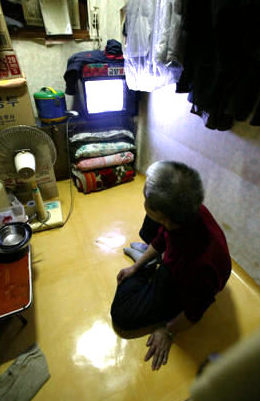 |
|
A low-income elderly woman in her room.
|
Many are forced to choose between needed drugs
Mr. Kim, 58, mostly stays at home these days due to his chronic arthritis. It is not easy for Kim to prepare a meal or even go to the bathroom. If he wants a free meal, he has to go to a soup kitchen nearby his home. However, he cannot even venture outside because of the severe pain in his ankles and knees. Kim’s life became more painful after the government introduced a new measure to prevent the overuse of pain-relieving skin patches, which contain doses of pain reliever that are absorbed into the afflicted area. Until last autumn, hospitals have prescribed him about 110 pain relief patches a month for free because the cost is covered by state medical aid for low-income qualifiers. But, after the government announced cuts to the program in September last year, hospitals reduced the number of pain relief patches available to each patient to about 40 sheets a month. Since then, Kim has purchased additional patches out of his own pocket when he needs them. In the lowest-income bracket, Kim receives 350,000 won (US$370) per month from the government. Of the government’s subsidy, about 280,000 won goes to rent and utilities. To buy additional pain relief patches, Kim said he had to cut back on heating his room. "My life is in shambles," he said. Since early last year, the Ministry of Health and Welfare has adopted a series of measures to save on low-income medical aid costs, saying there is economic ‘moral hazard’ in the way the low-income medical aid system is currently operated and used. The government last year put into effect measures including a ban on extra use of pain patches and a requirement that treatment lasting over a year meet prior approval from the government.However, medical experts and civic groups have accused the government’s measures of threatening health and livelihood of recipients of low-income health aid. According to data provided by a charity organization affiliated with the Anglican Church of Korea, there are a growing number of low-income people who have stopped going to hospitals due to the government’s measures. A 40-year-old man, who takes medicine daily for back pain and tuberculosis, was notified that he had to submit a "letter of prior approval" to the medical aid program, as his treatment had lasted longer than one calendar year. He instead dropped the tuberculosis medicine, assuming that after he filed the paperwork, the government would cut off funding for medicine for at least one of his two ailments. Ham Yun-suk, an official at the charity organization, said that the man "decided to stop taking drugs for tuberculosis because he couldn’t stop taking medicine for back pain because of his job." The ministry plans to implement additional steps to cut costs on low-income medical aid. About these plans, Yoo Eui-seon, an official at the Coalition for Poverty and Society, said that "a significant number of low-income individuals have already been shunned from hospitals. If additional steps are implemented, it will increase their burden." Please direct questions or comments to [englishhani@hani.co.kr]





